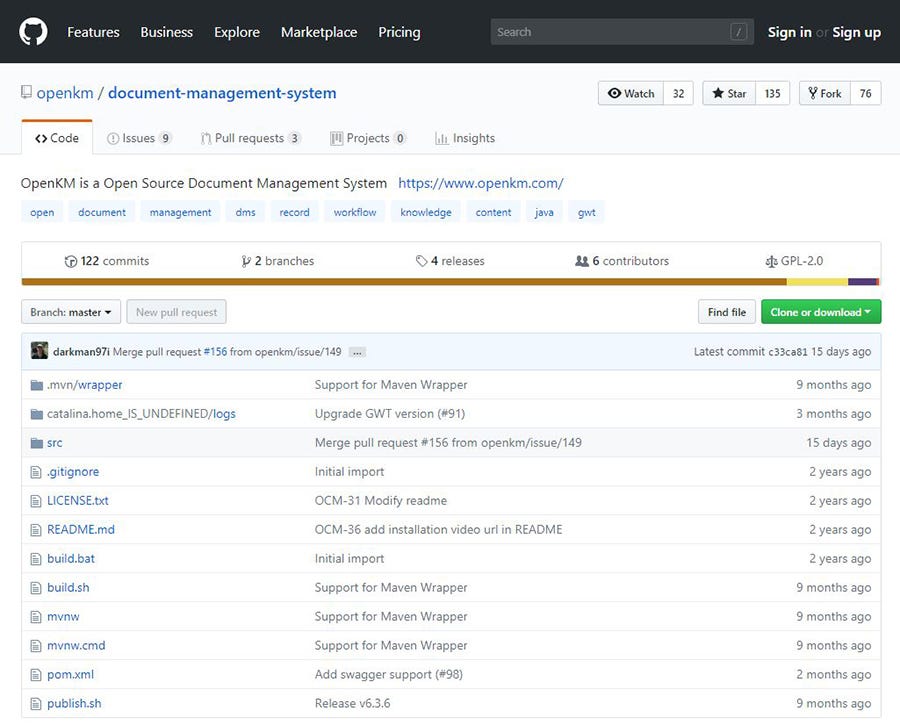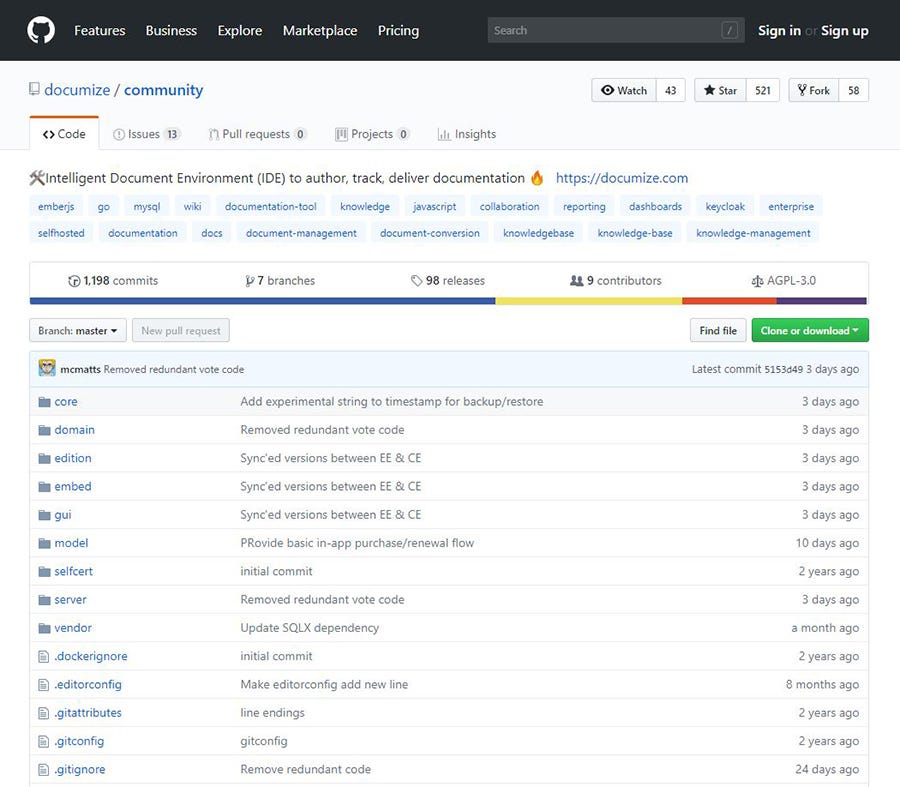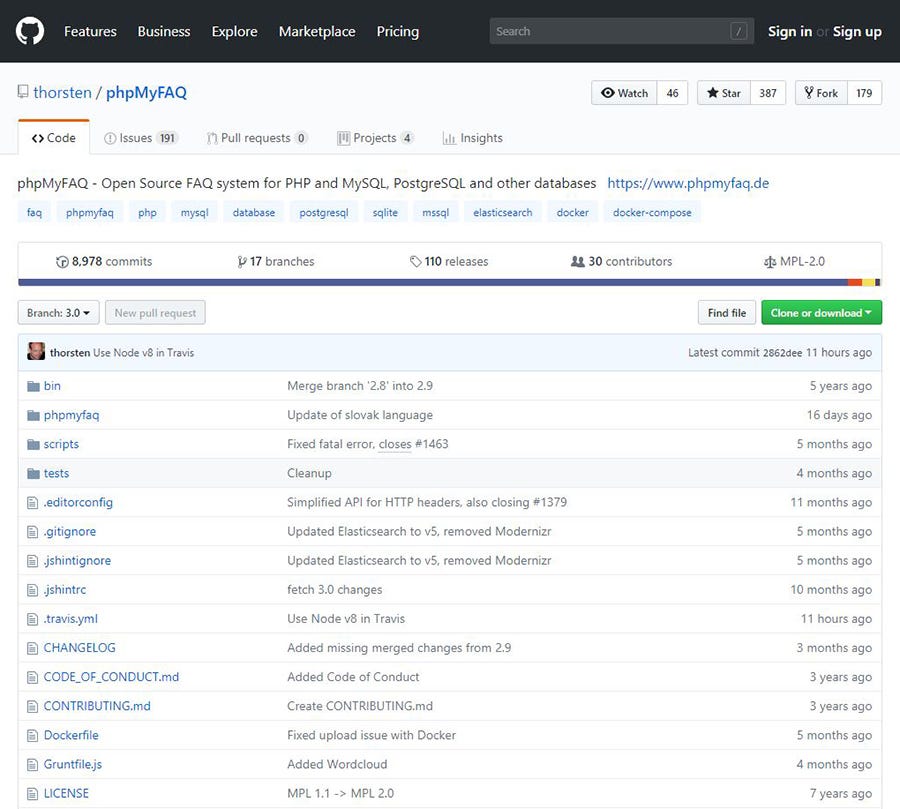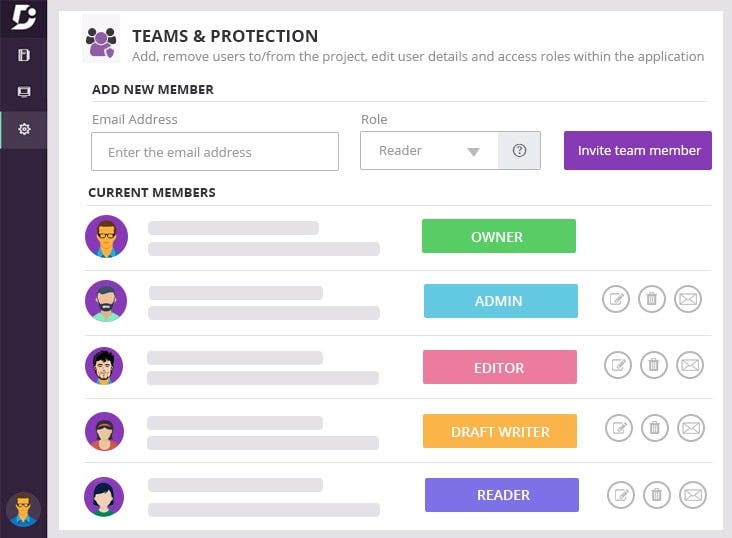Latest news about Bitcoin and all cryptocurrencies. Your daily crypto news habit.
by Jade Emmons at Document360
Open source software is a huge industry with many active projects. As a result, companies are interested in finding out more about open source knowledge base software. Using the open source model is a popular way to leverage the abilities of the crowd to produce software.
There are many definitions of “open source”, but here is one from opensource.com:
The term “open source” refers to something people can modify and share because its design is publicly accessible.
“Open” can refer to an absence of traditional hierarchical team structures, as well as a publicly accessible design.
In the case of software development, open source tends to refer to the source code of the software in that users can directly access the code. This code may be hosted in a GitHub repository like this:
Your developers can fork this repository to use it for your company’s own knowledge base software — as long as your usage complies with the terms of the license it has been published under.
To understand whether open source is right for your company, we need to look into the open source model.
Explanation of Open Source Knowledge Base Software
Open source in software also refers to the communities who are behind building the software. Based on this factor, open source knowledge base software then falls into two distinct categories:
- Software built by a very small team of developers (maybe just one) who may be volunteering their time, hosting the software source code online which is freely available to modify for your purposes.
- Software built by large company teams who mostly work on a closed source software stack, but the knowledge base product’s source code can be used and modified to some extent by external customers (for a fee).
Benefit #1
Open source knowledge base software can represent the opportunity to integrate the software code into your existing software stack for your company. You don’t need to rely on using an API because you can modify and use the code directly.
If you’re hosting a knowledge base for developers it can definitely be handy to have the software integrated with your other development tools and workflows.
Benefit #2
If you are an enterprise company with extensive security requirements, then open source knowledge base software can be hosted in-house. SaaS knowledge base software accessed through your internet browser, and hosted on your vendor’s servers.
If you choose open source knowledge base software, you will install and run your own version of the software on your servers.
Comparison Between Open Source Knowledge Base Software and SaaS
Now we’ve examined the benefits of open source knowledge base software, let’s take a look at why many companies are choosing SaaS instead.
Drawback #1
Many companies are attracted to open source software because they think they won’t have to pay, but this software is not actually free.
Most open source knowledge base software are available to “community users” free of charge, but if you are a larger company you will need to pay for usage the same as you would for a SaaS solution.
You also need to host open source knowledge base software on your own servers so it’s still not actually free.
Don’t worry about hosting and managing your knowledge base articles. Choose a SaaS Solution.
Drawback #2
Support for the software is normally provided through community forums and the like. There will be no official tech support for open source knowledge base software that you don’t pay for.
In contrast, a SaaS solution like Document360 is delivered through the browser and you pay a monthly subscription for the number of users you need. In return, you are fully supported to get up and running, and support is provided if anything ever goes wrong.
Drawback #3
Companies sometimes want ownership of the code so they can control product development.
But you don’t own SaaS solutions — or open source solutions. Open source software is published under licenses with terms that you need to comply with, so it doesn’t necessarily mean that you will have ownership over the code.
Even with open source knowledge bases, you need to ask the project maintainers to develop a feature you require. They may also take away features as they see fit.
Drawback #4
SaaS knowledge bases benefit from a product road-map, to which in-house resources are being dedicated in order to develop this software.
Don’t wait for the project maintainers to develop a feature you require. Choose SaaS solution for on-demand request.
Open source knowledge base software, in contrast, is usually dependent on developers who have volunteered their time to contribute to the project. It may suffer from a lack of momentum or direction.
Analysis of OpenKM
OpenKM is available in the SourceForge directory, the database of open source software and rated 4.5 stars out of 5.
OpenKM is more of a Knowledge Management solution, so that means if you’re looking for a customer-facing knowledge base then OpenKM may not be for you. You’ll typically be using it to host files internally, like PDFs and MS Word.
Knowledge Management is about collaboration, and curating internal knowledge in one repository with most users active contributors. In contrast, knowledge bases are usually centrally managed, aimed at a large audience of readers (typically your customers or internal staff).
With SaaS knowledge base solutions there is a dedicated customer support team, so you can benefit from relatively instant help if anything serious happens. With open source solutions like OpenKM your only option is to post to the forum unless you pay for support.
Open source knowledge base software usually sold in tiered plans like SaaS. OpenKM distinguishes between its Community Edition and Professional Edition, and if you want to find out pricing you are asked to contact their team. If you want any customer support you will need to pay for a plan.
Paying for every feature you request with OpenKM free edition? Don’t pay anymore! Choose SaaS solution!
You will not be able to access every feature of OpenKM using the free Community Edition.
OpenKM coded in Java. Here is a link to the repository on GitHub and their support knowledge base.
Analysis of Documize
Documize is also aimed at internal Knowledge Management. Built on an open source model encouraging users to contribute feature requests to Documize.
The idea is that Documize will build the product around customer needs without requiring costly integrations. It uses an interesting combination of the open source and proprietary models.
Documize moves one step beyond wiki software by allowing users to centralise their internal documents, and share them with external parties. What Documize doesn’t quite do is allow you to create a professional looking product knowledge base.
Do you know Opensource platforms have a pricing plan for any feature requests? Choose a SaaS solution to reduce the cost!
Documize also has Community Edition, which is their free version. Here’s a link to the repository on GitHub. Most of the features do not come with the basic plan so you will have to contact them to find out about their business and enterprise plan pricing.
Analysis of phpMyFAQ
phpMyFAQ is more like a true knowledge base product that’s intended to host customer-facing help content. The team behind it seems to work very hard on the software, and it has been going since 2001. Here’s a link to their repository on GitHub.
The software has unlimited FAQs, categories, users and groups. It also includes more than 40 languages to accommodate for multilingual audiences.
It’s been published under the Mozilla Public License 2.0. This means you have been guaranteed the free usage of phpMyFAQ, access to the source code, and the right to modify and distribute phpMyFAQ.
For phpMyFAQ, you’ll still need to provide your own database to use with their knowledge base software. As the name suggests, it’s written in PHP, and as you might expect there is no support available from the team other than through the forums or twitter.
Document360
Document360 is a SaaS solution. It provides a professional looking knowledge base for your company with many advanced features:
- Article collaboration — commenting and lifecycle
- Structured categories — for content hierarchy
- Advanced editing — with Markdown support and code blocks
- Customisation capabilities — HTML and CSS with custom images
- Integrations — with popular software such as Olark
- Security — differentiated team roles, backup and restore custom domain mapping
All of these features and more are including in every tier of the Document360 subscription. A huge portion of our development resource has gone into making Document360 a superior knowledge base product. We host the software for you, manage security behind the scenes, and provide instant customer support.
We have heavily invested in our user experience so the knowledge base software front-end interface looks professional. All you have to do is create your own content and customize the branding to suit your company’s needs.
Pricing plans are based on a model where you pay for a certain number of ‘writers’ for your knowledge base, but the number of ‘readers’ (ie your customers) is unlimited. Document360 is completely transparent about our pricing, which is displayed on the website.
Final Remarks
Overall, most of the knowledge base solutions we have discussed are open source in the sense that you can download and modify the source code. Most of the software still being sold for profit though, and it’s typically aimed at companies interested in improving their internal collaboration through Knowledge Management.
Most of these solutions aren’t suitable for use as a product knowledge base or even an internal team knowledge base. They are more like wikis for documents rather than help centers. phpMyFAQ comes closest to being a true knowledge base and it is also free.
All of the open source solutions require development resources in-house. If you choose SaaS, don’t have to worry about installations, hosting and development because it’s all done for you. Everything included in your monthly subscription.
Originally published at document360.io on November 15, 2018.
Open Source Knowledge Base Software Vs SaaS Solution was originally published in Hacker Noon on Medium, where people are continuing the conversation by highlighting and responding to this story.
Disclaimer
The views and opinions expressed in this article are solely those of the authors and do not reflect the views of Bitcoin Insider. Every investment and trading move involves risk - this is especially true for cryptocurrencies given their volatility. We strongly advise our readers to conduct their own research when making a decision.



